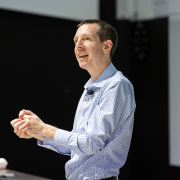Six members of the University of Chicago faculty have been elected to the American Academy of Arts and Sciences, one of the nation’s oldest and most prestigious honorary societies. They include Profs. Diane Brentari, Bonnie T. Fleming, Chuan He, Erik Hurst, Deborah L. Nelson and Amir Sufi.
These scholars have made breakthroughs in fields ranging from linguistics to particle physics to fundamental biology. They join the 2024 class, announced April 24, which includes 250 artists, scholars, scientists, and leaders in the public, nonprofit and private sectors.
Diane Brentari is the Mary K. Werkman Professor in the Department of Linguistics and the College. Her interests address the sign language grammars of Deaf communities around the world—how these languages emerge, and the degree of variation that exists among them. Throughout her career she has analyzed the formal, cognitive, and cultural dimensions that motivate the similarities and differences among these languages.
Her work focuses on sign language structure as a way to better understand the flexibility of the human language capacity in constructing spoken and signed languages, as well as the effects of communication mode (or modality) on language. Her current research has expanded to conduct analyses on a new protactile language, which includes the modalities of proprioception and touch, that is emerging in DeafBlind communities in the U.S.
Brentari is one of three directors of the Center for Gesture, Sign and Language and is the director of the Sign Language Linguistics Lab.
Bonnie Fleming is an internationally recognized particle physicist with outstanding expertise and a world leader in neutrino physics. She serves as the Deputy Director for Science and Technology and Chief Research Officer at Fermi National Accelerator Laboratory, where she leads all areas of science and technology at Fermilab, and holds a joint appointment with the University of Chicago in the Enrico Fermi Institute within the Department of Physics.
From 2004 to 2022, Fleming led a research group studying neutrinos as a professor at Yale University while also performing research at Fermilab. She was the founding spokesperson for the two neutrino experiments, ArgoNeuT and MicroBooNE, focusing on studying neutrinos and developing the next generation of accelerator neutrino detectors using liquid argon, and was an early member of the Deep Underground Neutrino Experiment (DUNE). She is known for pioneering a class of detectors called Liquid Argon Time Projection Chambers, which provided a giant leap forward in how scientists may study the varying states of neutrinos and how the subatomic particles might interact with matter. These detectors are the core to Fermilab’s neutrino experiments, including the future international DUNE.
Fleming currently serves as a member of the National Academies Decadal Survey in particle physics.
Chuan He is the John T. Wilson Distinguished Service Professor in the Department of Chemistry and the Department of Biochemistry and Molecular Biology. He is an expert in the field of RNA modification biology and cancer epigenetics. He was the first to champion the idea that modifications to RNA are reversible and can control gene expression.
His work is foundational to developing potential therapies that target RNA methylation effectors against human diseases such as cancer. Prof. He’s team was the first to identify eraser proteins, which can undo changes made to RNA molecules, which sparked the emergence of epitranscriptome research. Prof. He's team explained how RNA methylation functions through characterizing reader proteins—processes that known to play critical roles in many types of cancer.
A Howard Hughes Medical Institute investigator and fellow of the American Association for the Advancement of Science, He’s many honors include the 2023 Wolf Prize in Chemistry, the 2023 Tetrahedron Prize, and the 2023 Falling Walls Science Breakthrough of the Year in Life Sciences.
Erik Hurst is the Frank P. and Marianne R. Diassi Distinguished Service Professor of Economics at the University of Chicago Booth School of Business and the director of the Becker Friedman Institute. He is an economist whose work lies at the intersection of macroeconomics, labor economics and urban economics. His research has addressed topics such as declining male participation rates, the determinants of U.S. wage growth, the welfare losses to society stemming from gender and racial discrimination, the causes and consequences of urban gentrification, the economics of time use, small business dynamics, life-cycle consumption profiles, the role of housing and mortgage markets in driving macroeconomic conditions, and the choice to invest in human capital. His research has been extensively covered in The New York Times, The Washington Post, The Wall Street Journal and the Economist.
Hurst has received numerous honors and awards including the TIAA-CREF Paul A. Samuelson Award for Outstanding Scholarly Writing on Lifelong Financial Security, the Ewing Marion Kauffman Prize Medal for Distinguished Research in Entrepreneurship, the Emory Williams Award for Outstanding MBA Teaching and the McKinsey Award for Excellence in Teaching.
Hurst is a member of the Economic Fluctuations Group, Aging Group, and Public Economics Group at the National Bureau of Economic Research. He is a member of the Econometrics Society and a Fellow of the IZA Institute of Labor Economics. Hurst was a former co-editor of the Journal of Political Economy, NBER’s Macroannual, and the Journal of Economic Perspectives.
Deborah Nelson is the Helen B. and Frank L. Sulzberger Professor of English and dean of the Division of the Humanities. Her book Tough Enough: Arbus, Arendt, Didion, McCarthy, Sontag, Weil won the Modern Language Association’s James Russell Lowell Prize for Best Book of 2017 and the Gordan Laing Prize in 2019 for the most distinguished contribution to the University of Chicago Press by a faculty member.
She is also the author of Pursuing Privacy in Cold War America and articles published in PMLA, American Literary History, Contemporary Literature, Feminist Studies and in several edited collections. Nelson led a Mellon-funded Sawyer Seminar called “@1948” and edited with Leela Gandhi a special issue of Critical Inquiry devoted to the topic. She is a founding member of the research collective, Post45.
She has been the deputy provost for Graduate Education (2011-2015), the director of the Center for the Study of Gender and Sexuality (2006-2009) and chair of the Department of English (2017-2023). She has continued her work on graduate education with grants from the NEH (Next Generation Implementation Grant) in 2016 and the Mellon Foundation (Scholarly Careers Initiative) in 2018.
Amir Sufi is the Bruce Lindsay Distinguished Service Professor of Economics and Public Policy at the University of Chicago Booth School of Business. His research fits within the broader fields of finance and macroeconomics. While he has researched a number of topics, his main contributions have been in two areas: the role of household debt in macroeconomic fluctuations and empirical financial contracting. He is the co-author of House of Debt: How They (and You) Caused the Great Recession and How We Can Prevent It from Happening Again (2014).
Sufi was awarded the 2017 Fischer Black Prize by the American Finance Association, given biennially to the top financial economics scholar under the age of 40. He was elected as a Fellow of the Econometric Society in 2022.
He is also a Research Associate at the National Bureau of Economic Research, and co-director of the NBER Program on Corporate Finance. He serves as an associate editor for the American Economic Review.

